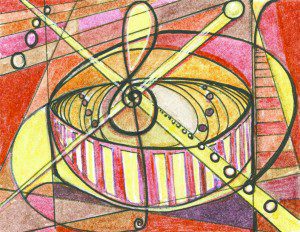Dr. Emery E. Alford, Dean, School of Arts, Humanities and Social Sciences
Florida SouthWestern State College
 All I ever wanted to do was play the drums. I still vividly remember sitting on the floor of my mother’s kitchen at a very young age with pots and pans of many shapes and sizes arranged in a circle as I flailed about with wooden spoons in hand striking my batteria in reckless abandon. As I grew older, I would setup my mélange of assorted items and rock out in front of the RCA Victrola, blasting away the Top 40 tunes of the day. I reached decibels well below what I would later experience performing as a percussionist in marching and concert bands, symphony orchestras, jazz ensembles and mega-watt rock bands of the late 60’s, 70’s and 80’s. (My ears are still ringing from a series of concerts I performed with The Moody Blues about 20 years ago.)
All I ever wanted to do was play the drums. I still vividly remember sitting on the floor of my mother’s kitchen at a very young age with pots and pans of many shapes and sizes arranged in a circle as I flailed about with wooden spoons in hand striking my batteria in reckless abandon. As I grew older, I would setup my mélange of assorted items and rock out in front of the RCA Victrola, blasting away the Top 40 tunes of the day. I reached decibels well below what I would later experience performing as a percussionist in marching and concert bands, symphony orchestras, jazz ensembles and mega-watt rock bands of the late 60’s, 70’s and 80’s. (My ears are still ringing from a series of concerts I performed with The Moody Blues about 20 years ago.)
I share this knowing without a doubt that my introduction to music in junior high school shaped my life. I grew up in a small south Texas town where life did not offer many opportunities for one to experience or appreciate the arts. Like most boys, I ran track, played basketball, and was pretty good at baseball. However, joining the school band at the start of my 8th grade – while my parents were divorcing – gave me an opportunity to channel my energies and love of playing the drums into a focused pursuit that gave me the greatest sense of achievement and happiness. As my musical skills increased, I dreamed of going “out west” with the hopes of becoming a studio musician performing music for the movies. Instead, I wound up performing professionally in symphony orchestras, Broadway touring shows, opera and ballet companies, and assorted rock, pop, and jazz groups while also spending 35+ years in higher education as a teacher and administrator. (I’ve also had several stints in the corporate world.) In retrospect, I now realize my ability to think, to question, to formulate an opinion, and to accept and embrace challenges as opportunities was an outgrowth of the knowledge, skills and abilities learned and developed through my background and experiences in the arts. While pounding away during my “drumming” years, I never imagined then how my exposure to the arts would enable me later to be a productive citizen beyond the concert stage.
Much has been written and argued as to the role and relationship of the arts and education. Countless studies and reports have been presented that affirm the achievement of higher test scores of students who have studied within the arts (i.e., SAT scores are often 40-50 points higher). In the Federal No Child Left Behind (NCLB) Act of 2001, the arts share equal billing with reading, math, science, and other disciplines as “core academic studies”(Critical Evidence, Ruppert, 2006). In the research compendium Critical Links (Deasy, editor 2002), summaries of studies conducted in dance, drama, visual arts, music and multi-arts provide critical evidence linking the study of the arts with student achievement and success – particularly in reading and language, mathematics, thinking and social skills, and motivation to learn. The ability to work “solo” or as part of a team is managed easily by musicians, actors, and dancers, much like those personified and sometimes glorified by students participating in athletic team sports. Critical thinking and interpretative skills, creativity, and higher-level problem solving traits are especially exhibited by students of the arts.
Critical Evidence concludes that “Learning in the arts is comprehensive¸ benefits associated with the student of the arts are inclusive to all students, and an arts-rich learning environment can have far-reaching effects. Starting to trickle in are the first round of required State reports assessing NCLB goals. I can only hope the evidence will show that in those programs where the arts were integrated and embraced, the value of arts in education is realized.
Finally, I have worked with literally thousands of music students and watched them attain success in a variety of occupations (most were not music majors). Like the ideal Renaissance man who should be able to sing, dance, play a musical instrument, understand the arts, and be a kind and charitable person, I encourage you to embrace arts in education and pursue your passion. Sing (like no one is listening –in the shower is a good place to start), dance (like no one is watching), and draw, finger-paint or color using every crayon in the box. Take your place on the stage of life and act out your fantasies (to the delight of your inner child). Try any of these, and you will live a way to a happy, healthy heART!
Florida Southwestern State College
www.FSW.edu – 1.800.749-2322







